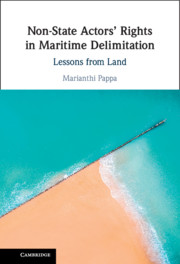
- Publisher:
- Cambridge University Press
- Online publication date:
- June 2021
- Print publication year:
- 2021
- Online ISBN:
- 9781108891936
- Subjects:
- Public International Law, Law, Human Rights
Last updated 09/07/24: Online ordering is currently unavailable due to technical issues. We apologise for any delays responding to customers while we resolve this. For further updates please visit our website: https://www.cambridge.org/news-and-insights/technical-incident


Most of the world's maritime boundary disputes involve privately held rights - relating to such matters as fishing, petroleum exploration and scientific research - that states have unilaterally granted to non-state actors in areas of overlapping national claims. An international lawyer would typically investigate the legality of a state's decision to create such rights without notifying or consulting its neighbour, and the legal consequences this action would have for the interests of the states concerned. Departing from this approach, Dr Marianthi Pappa examines such situations from the perspective of the non-state actors: what will happen to private rights in a disputed maritime area if it changes hands from state A to state B due to a subsequent delimitation treaty or judgment? Does the legal framework of maritime delimitation protect those rights effectively against a potential reallocation? To address these questions, the book considers the place that private rights have in land boundary-making.
‘Individual human-beings, private businesses, not for-profit entitles and communities are often the primary victims (and at times beneficiaries) of inter-state territorial disputes and ensuing changes. Dr Marianthi Pappa’s book superbly articulate the failure of international law to meaningfully address the rights and concerns of these private actors related to territorial alterations and challenges the state-centred approach to boundary delimitation and demarcation laws and practices. The book which advocates for a people-centred approach to boundary issues makes an original contribution to the field of the law of territory and general international law more generally.’
Zeray Yihdego - University of Aberdeen
 Loading metrics...
Loading metrics...
* Views captured on Cambridge Core between #date#. This data will be updated every 24 hours.
Usage data cannot currently be displayed.